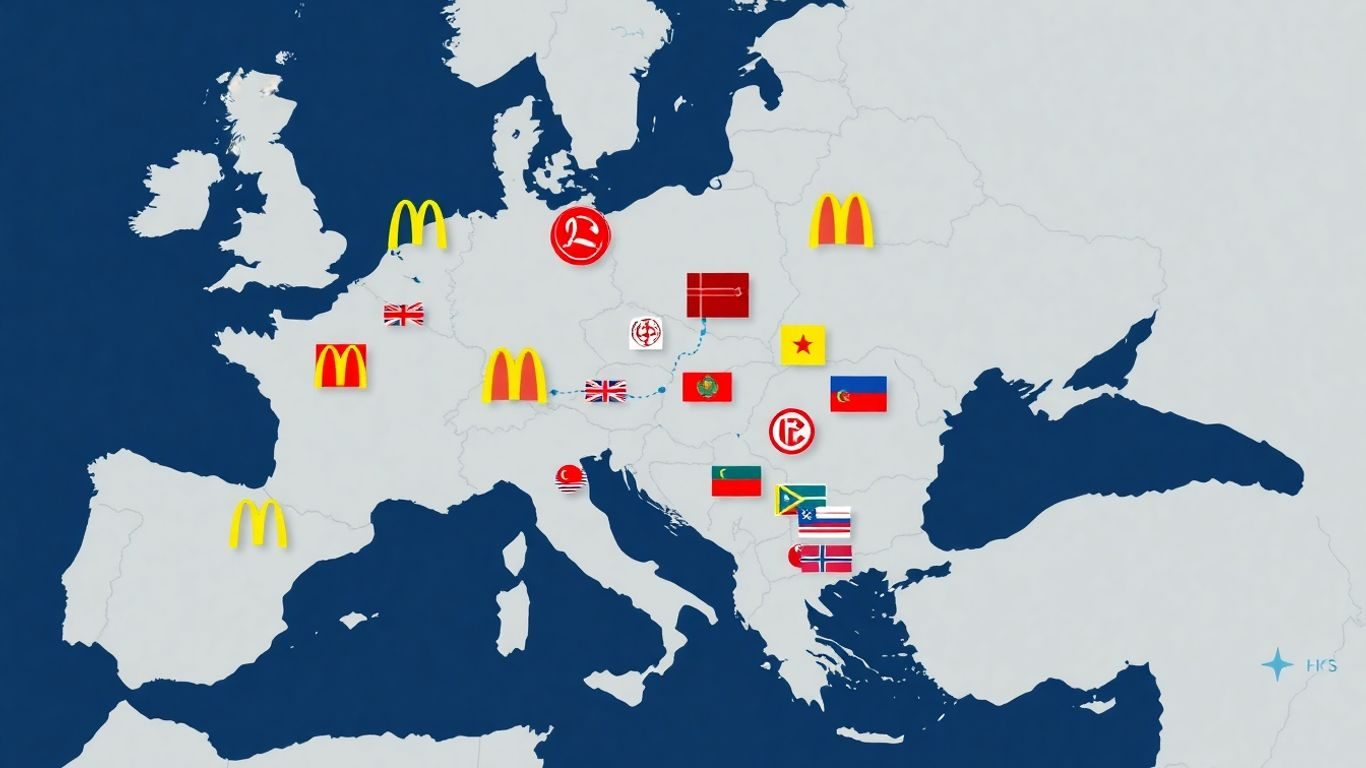Francize de succes care domină piața

Franchises have become a major player in the business world, offering a way for entrepreneurs to dive into a tested business model. With globalization, franchises are popping up all over the globe, making their mark in various industries. But what makes a franchise successful? And what challenges do they face in international markets? This article explores the rise of successful franchises and the key elements that drive their success.
Key Takeaways
- Franchises offer a ready-made business model, reducing startup risks for entrepreneurs.
- Globalization has expanded franchise opportunities across different countries and cultures.
- Food and beverage franchises are leading the industry, with fitness and home care also gaining ground.
- Innovation and adapting to consumer preferences are crucial for franchise success.
- Emerging markets present new opportunities but come with unique cultural and regulatory challenges.
The Rise of Successful Franchises in the Global Market
Key Factors Driving Franchise Success
Franchises have been booming globally, and it’s not just by chance. A key reason for their success is the proven business model they offer. This model provides a blueprint that’s already been tested and refined, making it easier for franchisees to hit the ground running. Another factor is brand recognition. When you open a well-known franchise, customers already know what to expect, which cuts down on the marketing effort. Plus, franchises often come with a support system that includes training and ongoing assistance, which is a huge help for new business owners.
Impact of Globalization on Franchising
Globalization has opened up new markets for franchises, allowing them to expand beyond their local borders. This expansion is a two-way street: while franchises can reach more customers, they also have to adapt to different cultures and consumer preferences. For instance, a franchise might need to tweak its menu or services to fit local tastes. This adaptability is crucial for maintaining relevance in diverse markets. The global franchise market, valued at USD 121.36 billion in 2023, is expected to reach USD 279.91 billion by 2032, growing at a CAGR of 9.73% during the forecast period. Learn more about the global franchise market.
Challenges Faced by International Franchises
Expanding into new countries is exciting, but it comes with its own set of challenges. Legal and regulatory hurdles can be a big headache. Each country has its own laws and regulations, and navigating them can be tricky. Then there’s the challenge of maintaining brand consistency across different locations. It’s important that customers have a similar experience no matter where they are. Lastly, cultural differences can pose a challenge. What works in one country might not work in another, so franchises need to be flexible and willing to adapt to succeed internationally.
Franchising is not just about replicating a business model; it’s about understanding and integrating into new markets while keeping the brand’s core values intact. This balancing act is what makes franchising both a challenge and an opportunity.
Top Franchise Sectors Dominating the Industry
Food and Beverage Franchises Leading the Way
When you think about franchises, food and beverage outlets are often the first to come to mind. From fast-food giants like McDonald’s and KFC to coffee chains like Starbucks, these franchises have a massive global presence. The reason? They offer a product that people need and love, no matter where they are. Whether it’s a quick burger or a morning coffee, these franchises cater to universal cravings. Plus, the lower initial investment compared to other sectors makes it an attractive option for new franchisees.
The Growing Popularity of Fitness Franchises
Fitness franchises are on the rise, tapping into the global health trend. People are more conscious about their health than ever before, and they’re willing to pay for it. Franchises like Anytime Fitness and F45 Training have been expanding rapidly, offering flexible workout solutions that fit into busy lifestyles. The appeal? A proven business model that capitalizes on a growing market. With minimal equipment and space requirements, these franchises are relatively easy to set up, making them a popular choice for entrepreneurs.
Emerging Trends in Home Care Franchises
As the global population ages, the demand for home care services is skyrocketing. Franchises in this sector, like Home Instead and Visiting Angels, are stepping up to meet this need. They provide essential services that allow seniors to live independently, offering everything from daily assistance to specialized medical care. This sector is not just about filling a need—it’s about making a difference in people’s lives. As more families seek quality care for their loved ones, home care franchises are poised for significant growth.
Franchising continues to evolve, with sectors like food, fitness, and home care leading the charge. Each offers unique opportunities and challenges, but all share a common goal: to provide consistent, high-quality services that meet consumer needs.
For more insights on the top trends in franchising for 2025, including the rise of eco-friendly practices and tech advancements, stay tuned!
Strategies for Building a Successful Franchise
Importance of Brand Recognition
Building a strong brand is like laying the foundation of a house; it needs to be solid. A franchise’s success heavily relies on its brand recognition. When people recognize your brand, they are more likely to trust it, and trust is everything in business. Think about it: why do people flock to McDonald’s or Starbucks? It’s because they know what to expect. For a franchise, this means consistent quality and experience across all locations. This consistency helps in building a loyal customer base that keeps coming back.
Leveraging Media for Franchise Growth
In today’s digital age, media is your best friend. It’s not just about traditional advertising anymore; social media platforms, blogs, and even podcasts can be powerful tools. Here’s a quick rundown on how to use media effectively:
- Engage with your audience: Respond to comments and messages. People appreciate a brand that listens.
- Create shareable content: Make videos or posts that people want to share. This increases your reach without extra cost.
- Collaborate with influencers: They can introduce your brand to a wider audience, often more effectively than traditional ads.
Using media smartly can significantly boost your franchise’s visibility and growth.
Effective Franchise Management Practices
Running a franchise isn’t just about following a manual; it’s about managing people and processes efficiently. Here are some key practices to consider:
- Training and Development: Regular training sessions ensure that all employees are on the same page and can deliver the brand’s promise.
- Communication: Keep the lines open between franchisees and franchisors. Regular updates and feedback sessions can prevent misunderstandings.
- Performance Monitoring: Use KPIs to track performance. This helps in identifying areas that need improvement and recognizing top performers.
Remember, successful franchise management is about creating a supportive environment where franchisees feel valued and motivated. This not only boosts morale but also enhances overall productivity.
By focusing on these strategies, franchises can build a strong foundation that supports sustained growth and success. For more detailed steps on ensuring franchise success, consider reviewing key steps for franchise success.
The Role of Innovation in Franchise Success
Adapting to Changing Consumer Preferences
In the fast-paced world of business, franchises need to stay nimble to survive. Consumer tastes shift rapidly, and franchises that can’t keep up risk becoming obsolete. Understanding what customers want and adapting quickly is key. This might mean altering product lines, updating store designs, or even changing marketing strategies. Some franchises have thrived by using customer feedback to guide their changes, ensuring they stay relevant.
Incorporating Technology in Franchise Operations
Technology is at the heart of modern business operations, and franchises are no exception. Many successful franchises have embraced technology to streamline operations and improve customer experiences. From mobile apps that offer easy ordering and payment options to advanced data analytics that provide insights into consumer behavior, technology is a powerful tool for franchises. It’s not just about adopting the latest gadgets; it’s about using them to make operations more efficient and customer-friendly.
Sustainability as a Competitive Advantage
With growing awareness about environmental issues, many consumers are choosing brands that prioritize sustainability. Franchises that incorporate eco-friendly practices can differentiate themselves from competitors. This might involve reducing waste, using sustainable materials, or implementing energy-efficient processes. By promoting their commitment to the environment, franchises can attract environmentally conscious customers and build a positive brand image.
Innovation isn’t just about new products or technologies; it’s about making meaningful changes that resonate with consumers. Franchises that innovate effectively can not only meet current demands but also anticipate future trends, ensuring long-term success in a competitive market. In 2024, the franchise industry faced a blend of challenges and opportunities, influenced by economic changes, technological advancements, and shifting consumer preferences.
Franchise Opportunities in Emerging Markets

Identifying High-Growth Markets
Exploring expansions into emerging markets is like opening a treasure chest for franchisors. Especially in regions like Asia and Latin America, there’s a buzz of untapped potential. These areas are booming with a young, dynamic consumer base that’s eager to try new things. To succeed, it’s crucial to pinpoint countries with rapid economic growth and a rising middle class. Keep an eye on urbanization trends and changes in consumer behavior. A smart move is to focus on cities that are investing in infrastructure and technology. They’re the ones setting the stage for future growth.
Cultural Considerations in Franchise Expansion
When you’re stepping into a new market, it’s not just about setting up shop. Cultural nuances play a huge role in how a franchise is received. You can’t just copy-paste a business model from one country to another. Understanding local customs, traditions, and consumer preferences is key. It’s about finding that sweet spot where your brand aligns with local tastes. Sometimes, this means tweaking your offerings or even your branding to resonate better with local audiences.
Legal and Regulatory Challenges
Every country has its own set of rules and regulations, and navigating these can be tricky. From understanding local labor laws to dealing with import tariffs and tax regulations, there’s a lot to consider. It’s essential to have a legal team or consultants who are familiar with the local landscape to guide you. Being compliant from the get-go can save a lot of headaches down the road. Also, keep in mind that regulations can change, so staying updated is crucial. Franchisors need to be flexible and ready to adapt to new legal landscapes as they expand.
The Financial Aspects of Running a Franchise
Initial Investment and Startup Costs
Starting a franchise requires a significant initial investment. This isn’t just about the franchise fee you pay to get the rights to use the brand’s name and system. There are other costs like equipment purchases, inventory, and sometimes even construction or renovation of the premises. It’s essential to have a clear understanding of these initial expenses to avoid surprises later. Knowing the total startup cost is crucial for making an informed decision.
Understanding Franchise Fees and Royalties
Once you’re up and running, ongoing fees come into play. These include royalties, which are typically a percentage of your revenue paid to the franchisor. This is apart from the initial franchise fee. Royalties are used by the franchisor for various expenses, including marketing and product development, which ultimately benefit the entire franchise network. It’s important to factor these into your financial planning to ensure you maintain profitability.
Financing Options for Franchisees
Getting the necessary capital to start a franchise can be challenging. However, franchises often have a better chance at securing loans than independent startups due to their proven business model. Banks and financial institutions are more likely to lend money to franchisees because of the established brand and support system. Exploring different financing options, like SBA loans or franchisor financing programs, can help ease the financial burden of starting your franchise.
Running a franchise is not just about having the capital but also understanding the financial commitments involved. Planning and managing these aspects effectively can lead to a successful business venture.
The Future of Franchising: Trends to Watch

The Impact of Digital Transformation
In today’s fast-paced world, digital transformation is reshaping the landscape of franchising. Franchises are increasingly adopting digital tools to streamline operations, enhance customer experience, and optimize marketing strategies. Technology is no longer optional; it’s a necessity. Franchises are using data analytics to understand consumer behavior better, while mobile apps and online platforms are becoming standard for engaging with customers.
- Implementing AI for personalized customer interactions
- Utilizing cloud-based systems for efficient management
- Leveraging social media for brand visibility
The Rise of Eco-Friendly Franchises
As environmental concerns grow, franchises are shifting towards sustainable practices. This trend is not just a marketing strategy; it’s becoming a core business principle. Franchises are adopting eco-friendly materials, reducing waste, and implementing energy-efficient solutions.
- Offering products with sustainable packaging
- Reducing carbon footprints with green energy solutions
- Participating in community-driven environmental initiatives
The Shift Towards Personalized Customer Experiences
Consumers today expect personalized experiences that cater to their individual needs. Franchises are responding by tailoring their services and products to meet these expectations. This shift is driven by the desire to build stronger customer relationships and increase brand loyalty.
- Customizing products and services based on customer feedback
- Using CRM systems to track and analyze customer preferences
- Creating loyalty programs that reward personalized engagement
Franchising is evolving with the times, embracing new technologies, sustainable practices, and personalized customer experiences. The future is bright for franchises that can adapt and innovate in these areas.
For more insights on how these trends are shaping the future of franchising, stay connected and keep an eye on emerging opportunities.
Wrapping It Up: The Franchise Path
So, here’s the deal with franchises. They’re not for everyone, but they sure do offer a solid path for many aspiring business folks. If you’re someone who can’t stand being told what to do or you’ve got a unique idea that’s just begging to be explored, maybe steer clear. But if you’re looking for a way to jump into business with a safety net, franchises are worth a look. They let you ride on the coattails of a brand that’s already made a name for itself, which can be a huge plus. Just remember, it’s not all sunshine and rainbows. There’s a lot of hard work involved, and you’ll need to play by the rules set by the franchisor. But for those who are ready to take the plunge, it can be a rewarding journey. Whether you’re eyeing a fast-food joint or a fitness center, the franchise world has something for everyone. Just make sure to do your homework and know what you’re getting into. Happy franchising!
Frequently Asked Questions
What is a franchise?
A franchise is a business system where a company (franchisor) allows an individual (franchisee) to run a location of their business, following specific guidelines and paying certain fees.
How much does it cost to start a franchise?
The cost of starting a franchise varies widely depending on the brand and industry. It can range from a few thousand to several million dollars.
What are the benefits of owning a franchise?
Owning a franchise offers benefits like brand recognition, support from the franchisor, and a proven business model.
Are there any downsides to franchising?
Yes, some downsides include high startup costs, ongoing fees, and less control over business operations.
How do I choose the right franchise for me?
Consider your interests, budget, and the market demand. Research different franchises and evaluate their support systems and success rates.
Can I sell my franchise?
Yes, you can sell your franchise, but you must follow the rules set by the franchisor, which often include approval of the new buyer.













